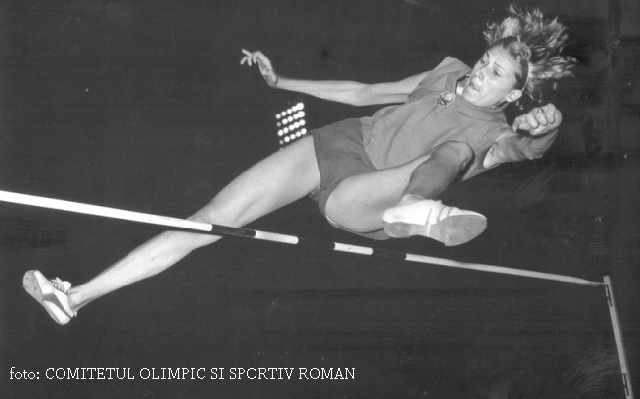Radio Romania International Sports club
Romanian Olympic legends: athlete Iolanda Balas-Soter

Florin Orban, 31.01.2024, 13:45
The world’s best athletes convene in the
Olympic Games every four years. The name Olympia is derived from the old Greek
settlement known as Olympia, located in the Peloponnese peninsula. In Antiquity,
Olympia played host to the athletic competitions of the Hellenic world, for
centuries.
Just like the
Antiquity competitions, the Olympics Games of the modern times created gods and
heroes, goddesses and heroines. Until the kick-start of the Olympic Games in Paris
on July 26, we will focus on legends of the Romanian Olympic competitors in a monthly
slot, based on the Golden Archivers interviews that have been broadcast by
Radio Romania international, throughout the years.
Today we pay tribute
to Romania’s greatest athlete, Iolanda Balaş-Söter. In 1999 she was the only
Romanian athlete to have received a nomination, from the International Athletics
federation, for the 20 Century Athlete title. She was a two-time high-jump Olympic
champion. She set 5 Olympic and 14 world records. Her records were unbreakable
for 11 years.
She took up training
in athletics with the Electrica Club in Timisoara, when she was 13. In less
than a year from her debut, she broke the national juniors’ record. When she was
19, she succeeded her first notable feat as a senior athlete, the 2nd
place at the European Championship In Berne, Switzerland.
Here is Iolanda Balaş-Söter, in a radio show broadcast in April 2000:
I have
always compared myself to the world’s best athletes. At that time, at the top
were the English athletes Sheila Lerwill and Thelma Hopkins, with European and
world records, and of course I asked myself the following question: if they
could, why couldn’t I ? And then, of course, the path I took to achieve my goal
became way more accessible, thanks to my strong resolve and the wish to accomplish
something serious and that’s what I succeeded and I have always thought, if I
was assigned to represent Romania, I had to get a good result, ’cause that is
what I came there for. My first success occurred in Berne, in 1954. The 2nd
place, unhoped for, but I was not satisfied with the 2nd place. I
said to myself: it can’t be! We need to aim higher; we need to jump higher! I’m
using the plural because my husband,
Ioan Söter, was also in Berne, as an athlete, back
then. Four years later, in 1958,
in Stockholm, I won the gold medal. It was my first success, my first gold
medal in a European competition.
Prior
to the European Championships in Stockholm, on July 14, 1956, in Bucharest,
Iolanda Balas set her first world record, with a jump of 1 meter 75 centimeters.
Iolanda Balas-Soter:
Quite so, quite so…A performance that just gave
me a lot of tremendous hope for the Olympic Games of 1956, and everyone went
like: that’s it, Iolanda will win the gold medal. Sadly, in Melbourne things didn’t
come out the way I wanted. And that,
also because my husband, having a brother in Australia, was officially denied
the travel, being my coach, from that moment on. And we went and had a stay in Australia
for three weeks, with no coach, with no moral and technical support and, while
I first ranked as favorite, I barely came in 5th. Imagine how
hard the blow was, for me, all the more so as the sports official of those
years called me a traitor of my homeland, saying I sold the medal to the American
Mildred McDaniel. It was the hardest blow I was dealt in my whole career as an
athlete, this defeat In the Olympic Games in Melbourne. I thought I would walk
home with gold and, four years after Melbourne, in 1956, here’s what I wrote in
my training notebook: I must have my comeback, I must have my comeback… And, using
a coin, I drew the five Olympic circles and every day I said I had to make it
up for the flop I had in Melbourne, and I did it, in the long run, in Rome, in
1960.
At
the Olympic Games in Rome, Iolanda Balaş again ranked as favourite…
In Rome, it was something extraordinary, which means I was just about to
travel there all alone, again, since my husband was still denied exit clearance
from Romania because, like I said, his brother was in Australia.
And some of the higher-ups of that time were dead positive we would stay in the
West. Well, we had our trials and tribulations trying to go to the Central Committee
of Romanian Workers’ Party, we were even received in audience by Gheorghe Gheorghiu-Dej,
then the Secretary General of Romanian Workers’ Party, and I said that if Soter,
my coach, didn’t come to accompany me in Rome, I would no longer represent
Romania. That was my wish so I could be successful there, lest I screw it like
I screwed it in Melbourne. And, at long last, for the first time in four good years,
Söter got the passport and could leave for Rome. He accompanied me, I won the
gold medal setting a new Olympic record, 1 meter and 85 centimeters, an exceptional
result at that time. In the morning we had the qualifiers, in the afternoon,
the final, it was raining slowly, constantly. But…to cut a long story short, I
won the gold medal. The satisfaction I had was fantastic, you can imagine.
Then, in 1964, the Olympic
success followed.
In Tokyo, I was dead set on yet again seizing the opportunity to prove, and
I succeeded, that the win in Rome did not occur by happenstance and I literally
repeated that performance: the gold medal, I mean, also setting a new Olympic record, of
1 meter and 95 centimeters.
Iolanda Balaş-Söter gained
her place in the book of world records thanks to her 140 consecutive wins.
My last last defeat
was in Melbourne, in 1956. Until 1967, nobody could break my records. Actually,
until I retired from competition.
From 1991 to 2005, Iolanda Balaş-Sőter was the President of the Romanian Athletics Federation.
She died on March 11, 2026, at the age of 79.






























